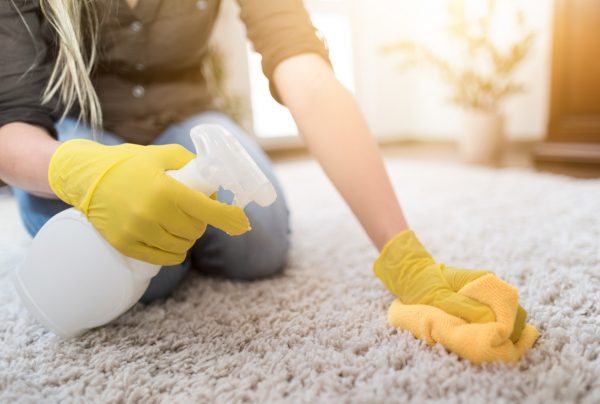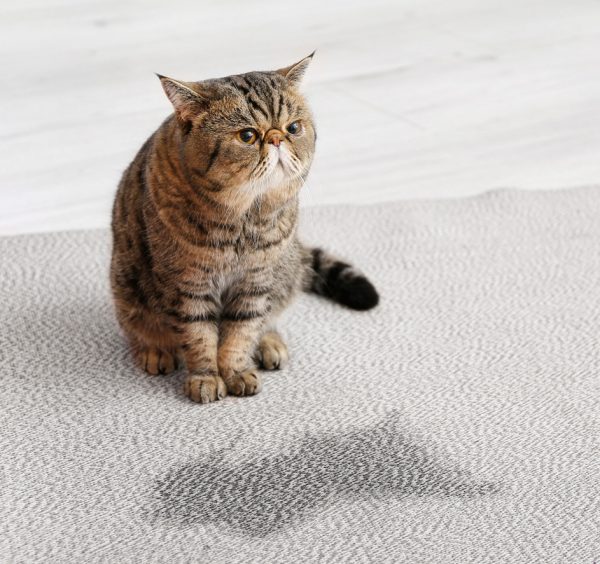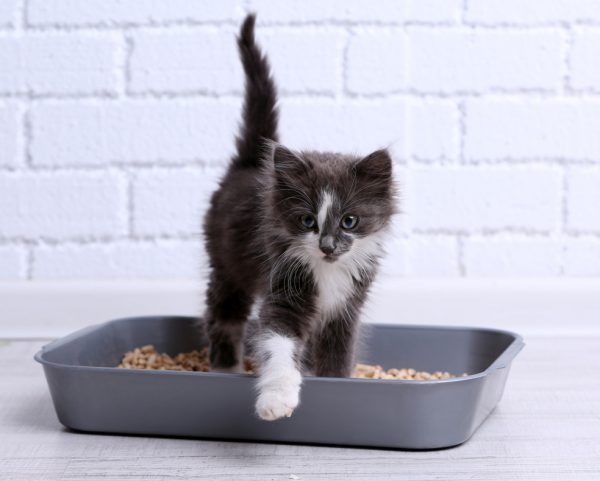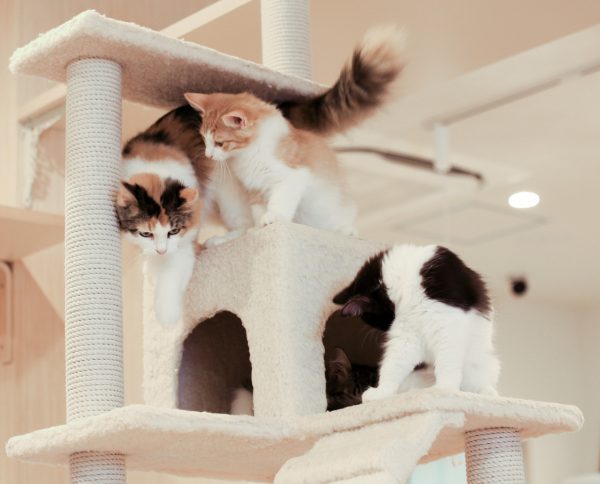How to Get Rid of Cat Urine Smell
There is no doubt that having a sweet feline for a pet can be one of the most rewarding things for an animal lover. But, like all things, there are some noticeable (and smelly) drawbacks, especially if pet owners must deal with their cat spraying. Unfortunately, figuring out how to get rid of cat pee smell is one problem that cat owners must deal with occasionally.
The stench of cat urine outside the litterbox is unbearable to most cat owners, which is why many want to know how to get rid of it and which products are most effective in doing this. Although many products and smell neutralizers are available, the focus should be on preventing the cat from peeing or spraying in any other place besides its litterbox. If the accidents are addressed more than the root issue, the cat will more than likely continue the pattern of peeing in various areas around the house.

Why Does My Cat Pee on the Floor, Mattress, or Clothes?
Almost every house cat learns early on that litterboxes are where they go to do their business. For this reason, many cat owners are left perplexed when they discover their cat urinating or spraying urine in every place except the litterbox.
Medical problems related to the urinary tract, stress, and age-related issues such as arthritis are all possible reasons why a cat refuses to use its litterbox. It has been proven time and again that no matter how moody a cat may appear, it does not intentionally skip the litterbox to get back at its owners.
For this reason, if a cat that is potty trained begins to prefer the floor, mattresses, or clothing as its new litterbox, a vet may need to be seen to determine why this is becoming a consistent pattern.
Why Do Cats Spray?
Instead of squatting to urinate like many animals, some cats begin spraying their urine in a vertical direction on anything but the litterbox. Naturally, this is a difficult action to correct and is therefore a headache to cat owners that try to prevent the cat from peeing this way. Two reasons why cat spraying may begin are outlined below.
- Mating: Both sexes of cats have been found to spray urine vertically when they are signaling their territory (males) or making their availability to mates known (females). Cats that are fixed do not do this, so vets recommend fixing them to avoid such issues.
- Anxiety and Stress: Cats also tend to spray their pee as a reaction to sensations of anxiety or annoyance. When cats become annoyed with a certain situation or feel threatened by other cats within the house or neighborhood, they may being spraying out of retaliation. It is best to encourage good behavior and help the cat relax as much as possible if this is occurring.

How to Get Cat Urine Smell Out of Carpets
The following are the go-to steps for getting the pungent smell of cat urine out of carpets or vertical surfaces that the cat may have sprayed on.
- As soon as the cat pee is found, it must be absorbed as much as possible with a cloth or paper towel.
- Although baking soda, hydrogen peroxide, and vinegar can be good solutions to pour onto the soiled spot to help neutralize the smell, one of the best products for those wanting to know how to neutralize cat urine is called Stink Free. This product that can be used on furniture and carpets to remove urine traces deep within. Stink Free is non-toxic and eliminates the smell of cat urine and spray from these surfaces completely.
- Enzyme removers, such as the Smiling Paws Pets Stain and Odor Eliminator, are another option that can be considered when cleaning cat urine from a carpet. This product is toxin-free and safe to spray on a wide variety of surfaces, such as carpets, rugs, hardwood flooring, and pet carriers. Smiling Paws Pet Stain and Odor Eliminator contains urine-eating enzymes that eliminate the urine. The enzymatic remover removes the odor and the residual stains. It also removes the smell so that cats will not be tempted to return to spray or pee in an area a second time.
Why Cat Urine Smells
The distinct stench that comes from cat urine or spray is the result of it going through the stages of decomposition. One of these stages includes the urine letting off mercaptans, which are compounds that can also be found in skunk spray. A highly recommended brand of litter to help further eliminate urine smells is Dr. Elsey’s Precious Cat Litter. It not only masks the scent, but it is the best natural clumping cat litter for a low price.

Urinary Problems in Cats
When it comes to cat health, urinary problems can trigger the cat’s tendency to abandon the litterbox for the carpet or mattress. If urinary problems are present, urinating may become very painful for the cat. Therefore, urinating in a litterbox may induce anxiety or fear—leading the cat to avoid the litterbox and being spraying urine instead.
The following health problems can cause this reaction from a cat:
If a cat begins avoiding the litterbox, potential underlying health issues should be ruled out by a vet. In addition, if blood in cat urine is seen, this indicates an emergency. This could signal a possible blockage in the urinary tract, which is excruciating for the cat. A cat left untreated could die within a day’s time, which means time is of the essence in these cases.
Treating Urinary Problems in Cats
When it comes to a cat urinary tract infection, treatment and antibiotics are left up to the discretion of the veterinarian. In normal cases, a cat with a UTI will be diagnosed through a physical examination, blood work, or radiograph (X-ray). The treatment is usually antibiotics (such as amoxicillin) given to the cat orally. However, whatever form of treatment the vet chooses should be adhered to entirely until the spraying or urinating outside the litterbox is completely stopped.

How to Stop a Cat from Spraying
Most cat owners do not understand that a cat must have its own private space to urinate. If a litterbox is out in the open where humans can see it, the risk of having a cat spray in other areas where no one can see them can often occur.
If another cat stands by the litterbox or blocks them from going, the other cat will find its own space (or bed) in the house. This lets the owner know right away there is a problem or health condition (such as crystals in urine).
If the household only has one cat, and a new dog is visiting or brought into the home permanently, the likelihood of cat spraying will happen if the cat cannot locate its own peaceful, hidden place to urinate.
Experts recommend only bringing in a small kitten versus a dog or fully grown cat to a house with an older cat (one year or older) to minimize any cat spraying problems.
Bad Cat Behavior and Bullies
If a cat that is urinating outside of its litterbox or spraying on the walls is living with several other cats, some adjustments may need to be made. Felines are territorial creatures that need their space to do their business. Litterboxes that are compact in size and placed in a busy part of the house may discourage a cat from using it.
If multiple cats reside within the same household, they should all have their own litterbox away from the other cats. Cats that are especially territorial may bully other cats that attempt to urinate around them by physically harming or harassing them. Spraying urine is one way that a cat will attempt to mark its territory. Therefore, keeping litterboxes in separate areas will eliminate the threat to the cat’s territory.



